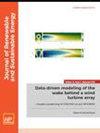区域经济-技术-可再生能源耦合协调发展评价与分析——以中国为例
IF 1.9
4区 工程技术
Q4 ENERGY & FUELS
引用次数: 1
摘要
面对能源短缺问题和减碳责任,要实现区域经济可持续发展,必须大力发展可再生能源。技术不仅可以促进可再生能源的发展,而且可以成为经济的新动力。然而,经济、技术和可再生能源的发展是相互关联的,它们之间的耦合和协调缺乏足够的评估和分析。因此,构建了经济-技术-可再生能源三元群的评价指标体系。评价模型用于衡量耦合协调度,地理加权回归模型用于分析关键因素的影响及其空间差异。以中国30个省份为例进行研究,结果表明,除广东保持在极协调水平外,大多数地区的耦合协调程度较低,大多数省份在这十年中都处于波动上升趋势。此外,地理加权回归的结果表明,各因素的影响具有空间异质性。该研究为我国相关政策的制定提供了依据,评价分析思路可为其他国家或地区提供借鉴。本文章由计算机程序翻译,如有差异,请以英文原文为准。
Evaluation and analysis of regional economic–technology–renewable energy coupling coordinated development: A case study of China
Facing the problem of energy shortage and the responsibility of carbon reduction, to achieve sustainable regional economic development, renewable energy must be vigorously developed. Technology can not only boost the development of renewable energy but be a new driving force for the economy. However, the development of the economy, technology, and renewable energy are interrelated, and the coupling and coordination among them lack sufficient evaluation and analysis. Therefore, an evaluation index system is constructed for the economy–technology–renewable energy ternary group. The evaluation model is applied to measure the coupling coordination degree, and a geographically weighted regression model is used to analyze the influence of key factors and their spatial differences. 30 provinces in China are used as examples for the study, and the results show that the coupling coordination degree is low in most regions, except for Guangdong, which has been maintained at an extremely coordinated level, and most provinces are in a fluctuating upward trend during the decade. Additionally, the results of the geographically weighted regression report that the influence of factors has spatial heterogeneity. The study provides a basis for relevant policy formulation in China, and the evaluation and analysis ideas can provide a reference for other countries or regions.
求助全文
通过发布文献求助,成功后即可免费获取论文全文。
去求助
来源期刊

Journal of Renewable and Sustainable Energy
ENERGY & FUELS-ENERGY & FUELS
CiteScore
4.30
自引率
12.00%
发文量
122
审稿时长
4.2 months
期刊介绍:
The Journal of Renewable and Sustainable Energy (JRSE) is an interdisciplinary, peer-reviewed journal covering all areas of renewable and sustainable energy relevant to the physical science and engineering communities. The interdisciplinary approach of the publication ensures that the editors draw from researchers worldwide in a diverse range of fields.
Topics covered include:
Renewable energy economics and policy
Renewable energy resource assessment
Solar energy: photovoltaics, solar thermal energy, solar energy for fuels
Wind energy: wind farms, rotors and blades, on- and offshore wind conditions, aerodynamics, fluid dynamics
Bioenergy: biofuels, biomass conversion, artificial photosynthesis
Distributed energy generation: rooftop PV, distributed fuel cells, distributed wind, micro-hydrogen power generation
Power distribution & systems modeling: power electronics and controls, smart grid
Energy efficient buildings: smart windows, PV, wind, power management
Energy conversion: flexoelectric, piezoelectric, thermoelectric, other technologies
Energy storage: batteries, supercapacitors, hydrogen storage, other fuels
Fuel cells: proton exchange membrane cells, solid oxide cells, hybrid fuel cells, other
Marine and hydroelectric energy: dams, tides, waves, other
Transportation: alternative vehicle technologies, plug-in technologies, other
Geothermal energy
 求助内容:
求助内容: 应助结果提醒方式:
应助结果提醒方式:


